GENOCÍDIO – A long history of love for metal
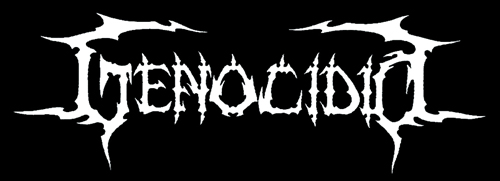
As many of you may know, Genocídio is an eternal underground band from Brazil, which started its activities in the middle of the 80’s and never stopped playing since then! Nowadays, after lots of great albuns, they come back with their 9th full-length, called “In love with hatred”, another awesome piece of old school Death Metal. So, let’s see what Wanderley Perna, founder and the only original member of the band so far, and Murillo Leite, vocal/guitar since 1992, have to say to the reader about such a long history of uninterrupted dedication to the underground music.

Some bands
1. Hi, Wanderley Perna, how do you do? Thanks for taking your time to answer some questions to Old School Metal Maniac! How is Genocídio doing right now?
Wanderley Perna: Hail man, thanks a lot for the interview in your magazine!! We are currently working on the promotion of our latest album “In love with hatred”, which was released in December 2013. We have also been playing some gigs in Brazil and maybe we'll have one or two shows in Latin America.
2. Well, the band was formed in 1986 and you are one of the few Brazilian bands (and from overseas too!) that have kept active during all these 28 years! This is really difficult in the musical scene in general. So, how could you keep the band active for such a long time? What is the secret?
WPerna: The real secret is that we play for fun, making the music we like without worrying about the trends. When we started playing, we just wanted to play aggressive riffs with challenging lyrics and have our own personality!

3. By the way, you are the only original member. How is it for you? Do you feel that your responsibility is bigger because of this fact?
WPerna: It is rewarding to be able to play and raise the Metal flag today! I think the biggest responsibility is to be playing and making extreme music with Genocidio’s quality seal.
4. Do you still remember what was your main motivation to form a band at that time? What were the main difficulties for you?
WPerna: When some Brazilian bands’ albums started to come out such as Sepultura’s "Bestial Devastation", Sarcofago’s "INRI," among others, I realized that Extreme Metal was gaining share in the Brazilian scene, then it certainly motivated me a lot. On the other hand, we are from a city where there was no room for heavier bands like us then and lots of times we played at festivals with Hardcore bands, which made it very difficult to us.
5. How was the underground scene back then? Was it really strong in your área? Which bands did you hang out with?
WPerna: The Death Metal scene in our town was very small, so we used to play in other cities where the scene was busier with bands like Sarcófago, Chakal, Sex Trash, Dorsal Atlântica, Attomica, among others.
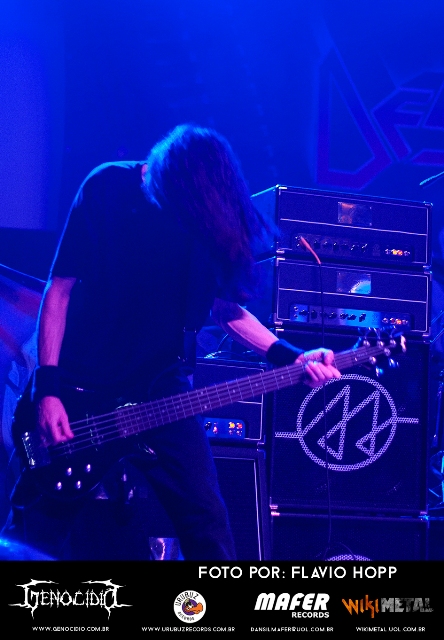
6. What bands did influence you in 1986? It seems that you were too extreme for the period, but we know that there weren’t many extreme bands in Brazil at that time. So, how could you make such a fast and heavy music? Was it instinctive?
WPerna: The major influences at that time were: Venom, Hellhammer, Sodom, Kreator, Discharge, Sepultura…we wanted something more aggressive and with extremely guttural vocals...that was our recipe for the EP "Genocidio".
7. What about your first demo-tape, “Fall of heaven”? Was it distributed overseas by tape-trading?
WPerna: Exactly, it was the only way to spread our work then. We sent tapes to several zines worldwide!
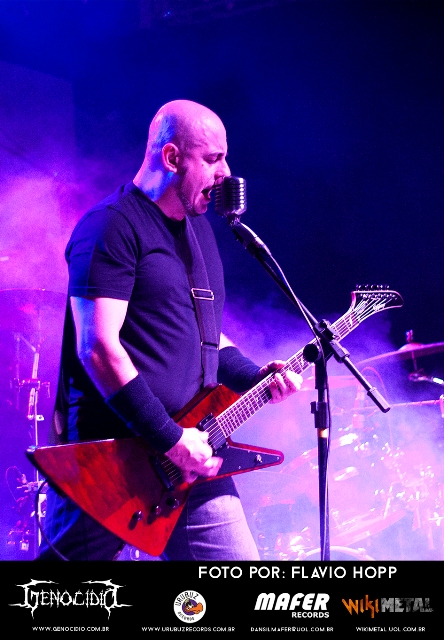
8. Your first EP is a landmark for many people, including me, because of its brutality. I remember that we were all in shock with all that growling vocals and spectacular speed. Do you still remember how was the reception of it in Brazil and outside the country too?
WPerna: Of course I remember, a lot of people thought that Marcão’s vocals had effects in his voice, but it hasn’t! We received letters from different countries praising our work, the album was distributed in Germany and in the US as well. And nowadays it keeps being important for us, once it was recently reissued in a deluxe version in Greece.
9. The classic line-up that recorded this ep, with you, Juma and Marcão, has been together up to your 3nd full-length, “Hoctaedrom”. What happened to them after that? Do you still get along well with them?

WPerna: Marcão returned to Genocidio in 1997 and recorded two albums "One Of Them..." and "Rebellion" after that I never met him again! Juma yet recorded the album “Posthumous” in 1996, after that he became a tattoo artist and sometimes we run into each other around, since we still live very close. And for “Hoctaedrom” we had the addition of a another guitar player, Murillo Leite, who joined the band on the last leg of “Depression” album tour and currently keeps playing with us, as a singer as well.
10. We know it was very difficult to get a deal at that time. How did you get one with Ultra Violence records? By the way, it seems that this was their only release...do you know why?
WPerna: We took part in a radio program on the station Radio Corsario, which played one of the songs from the demo "The Grave". The following day, the owner of Ultra Violence called me and said he wanted to release our music. The craziest thing was that it was a Punk/Hardcore label, but we accepted it anyway and it worked out.
11. After this first release, you got a deal with Heavy Metal Maniac and released “Depression”. What changed from the first EP to this release in your point of view in terms of music, production and reception?
WPerna: At that moment we were about to release our first full-length album, but we wanted to do something different, without losing our aggressiveness while incorporating outstanding melodies. I must say it was an innocent seed of Gothic Metal, the result was the song “Depression”!
12. Probably you played many gigs at the end of the 80’s, mostly in the countryside of São Paulo, as you have some official demos recorded live. Which bands have you played with? Do you remember which shows were the best ones?

WPerna: We’ve played along with several bands including: Sarcófago, Chakal, Dorsal Atlântica, Anthares, Explicit Hate, Desaster, Necromancia, Cova, among other ones. All of them were quite special, mainly because they were important bands from the Brazilian Metal scene.
13. By the way, you have already released two live DVDs. Why do you like this kind of release?
WPerna: Actually, we have released only 1 DVD, named "Probations" in 2007. In the 90’s, we would spread a VHS tape with a concert recorded at Aeroanta in São Paulo, but it ended up coming out unofficially. It has become a bootleg video.
14. During the 90’s, Genocídio has experimented with different kinds of influences, ranging from doom to gothic and also flirting with punk and post-punk music. Did you suffer any kind of criticism because of this option of opening your music up? If so, how did you cope with these bad reactions?
Murillo Leite: Fortunately not. Since we have recorded “Depression”, we flirted with other musical styles, so this sort of challenge became a trademark for Genocídio, which gives us a lot of pride. We’re not a predictable band though we are coherent in our choices. Obviously, some fans didn’t accept these mixtures, however, the great majority understood and enjoyed the innovation we’ve always added into our music.
15. Listening to some of the recordings of this era, I can perceive some similarities with the so-called avantgarde metal, although the term was not so used at that time. What do you think about that?
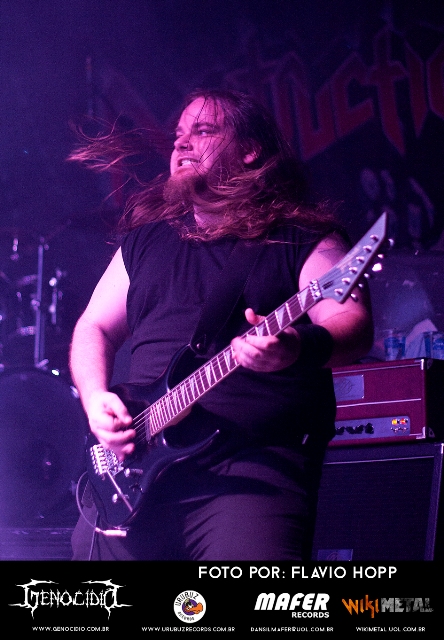
MLeite: To be honest, we only thought in bringing out some new stuff into our sound, because our musical instinct ever needed to be fulfilled with distinctive tunes.
16. At the same time, these experiments in your music made the band gain more fans from other styles too. Did you notice this too, I mean, this change of profile of the typical Genocídio fan?
MLeite: For sure! And it also extends to some covers we have played so far, as The Sisters of Mercy, Joy Division. We have widened our horizons doing this kind of thing!
17. Do you think that these changes in the musical direction had more to do with the changes of line-up or more with your own mind and artistic view?
MLeite: Nice reflection of yours! I would point out that these changes are more credited to Genocidio way of thinking and acting than line-up changes. Everyone who joined the band needed to be fit to this ideology.
18. Can you define with a few words all of your seven official releases so far? I mean, your full-lengths only, ok?
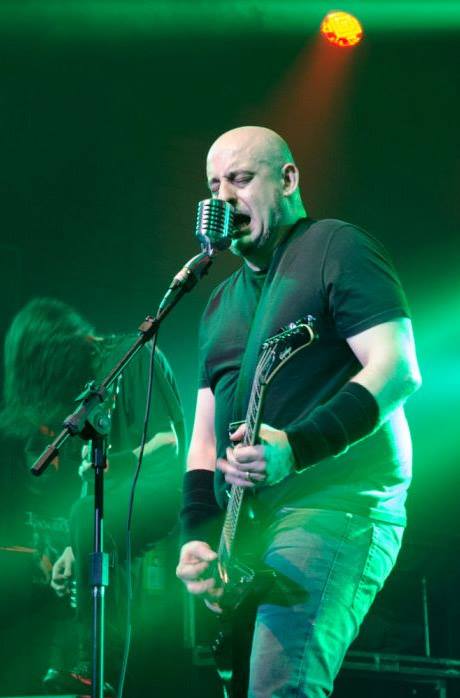
MLeite: “Depression” – Innovative and disturbing, “Hoctaedrom” – Mixing technical Death Metal and experimentation, “Posthumous” – Dark, heavy and bluesy, “One of them…” – Confusing and somewhat produced, “Rebellion” – Back to the roots of Death Metal, “The clan” – Our classic Heavy Metal album and “In love with hatred” – Anger-skilled Metal masterpiece.
19. By the way, how was the release of your last album, “In love with hatred”? I’ve heard it and it’s really brutal and heavy, maybe heavier than your previous releases, sounding way more death metal. Do you agree with me?
MLeite: You bet! This album shows a band pushing their limits in order to express the whole rage and passion regarding Death Metal issues. We are extremely glad with the upshot we got recording this stuff!
20. How is it being received by the press and the fans? It seems that the reactions are mostly positive, am I right?
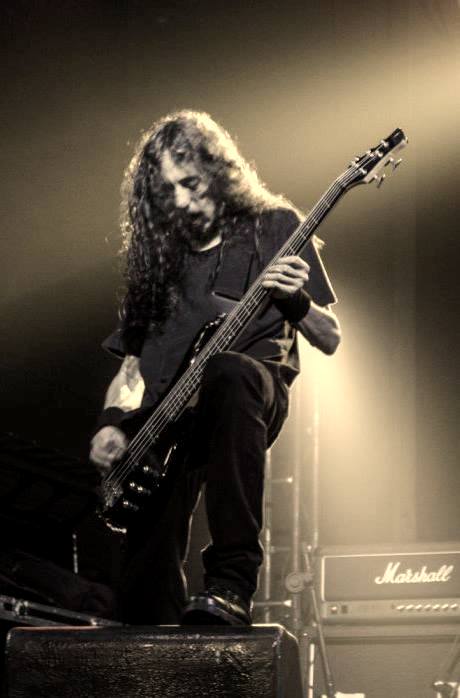
MLeite: Yeah, you’re quite right! I think the best way to measure acceptance is seeing that people are looking for us, either coming to our shows or getting our merchandise, what makes us believe this album was a blast!
21. The new album is really well-produced, although this does not mean that it sounds modern. It keeps the essence of metal untouched. Did you have this in mind when recording the album and in the choice of the producers Marco Nunes and Gilberto Bressan?
MLeite: Indeed, Gilberto Bressan didn’t take part this album, he helped us a lot when recording “The clan”. Marco Nunes has produced our two last albums, and he did a great job in both cases. That was our real goal, your impression is absolutely right, we wanted to sound pretty heavy with a production that enabled people to understand what we were playing.
22. The new full-length was also released in vinyl version. Why did you decide to do that? Do you still feel excited of putting your hands in a vinyl just like we did some decades ago?
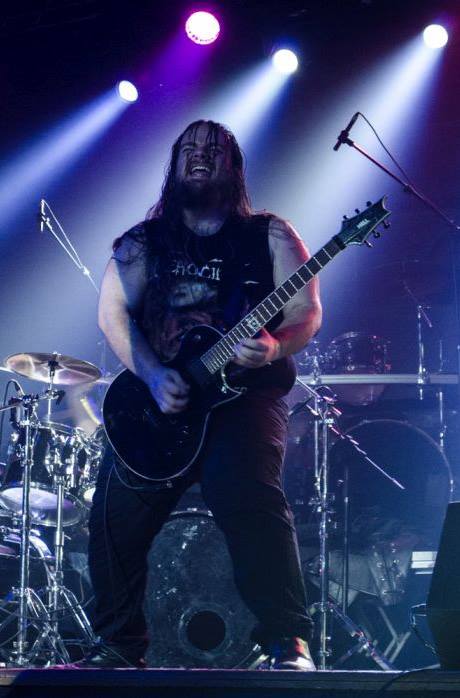
WPerna: We are from the vinyl-and-tape era, but I have nothing against CD... When we were invited by Mafer Records to have a vinyl version of the album was like going back in time!
MLeite: The last time we felt this way when releasing an album was in “Hoctaedrom” time, over twenty years ago.
23. By the way, it seems that the vinyl culture is getting stronger again. What do you think about that? Can you imagine the reasons why this is happening now, after so many years of CDs and all the mp3 culture? Is it a kind of reaction against the depreciation of music?
WPerna: In fact it's just a small market for collectors. Unfortunately, the majority of the people now prefers MP3.
MLeite: For me vinyl has become a hobby, as drinking wine or smoking cigars, few people will know how to enjoy it.
24. As you follow the Brazilian underground scene since its inception, which are the main differences you notice comparing the old times with the present? Also, being an old peer of the scene, why do you think people like so much the Brazilian underground scene overseas?

MLeite: Some things are better than before, for example, good instruments were very expensive and mainly imported, nowadays, people have more access to high-quality gear, which improved musicians’ performances. The Internet is a faster way to promote your music, we had a slower communication with fans then. One thing that could be in a higher level is the infrastructure available to play gigs, which sometimes is poor, jeopardizing bands’ evolution. But, in general, things are going on a good way.
25. In this sense, how is the popularity of Genocídio outside Brazil? Do you feel you get enough recognition from fans all over the world after so many years of music?
MLeite: We’ve always had fans in all corners of this world, they’re not a massive group, however, they know our history and keep in touch with us. We feel it’s awesome, and every time we get surprised when someone contact us from a distant place.
26. In fact, some people think that Genocídio is a band unfairly underrated, in comparison with bands like Sepultura, Sarcófago, Vulcano or Mutilator, for instance. Do you agree with that? If so, why do you think that Genocídio did not get the same attention as these old bands, especially considering that you never stopped playing?
WPerna: I believe the greatest fault was ours, because we lost some opportunities both in Brazil and in Europe. We relied too much on Heavy Metal Maniac/Hellion Records and they were both motherfuckers! This made the band regress for a while.
27. Looking back to your long career, is there anything you regret in terms of Genocídio?
MLeite: I would say that regret is something you should feel for the things you haven’t done, not for the ones you’ve done. Based on this, all things we’ve done were because we intended to do so, thus we try to enjoy the moment, because the one we are living by now is quite cool.
28. How do you evaluate your life in the scene? Are you satisfied with the results, despite all the adversities every band has to face in the underground?
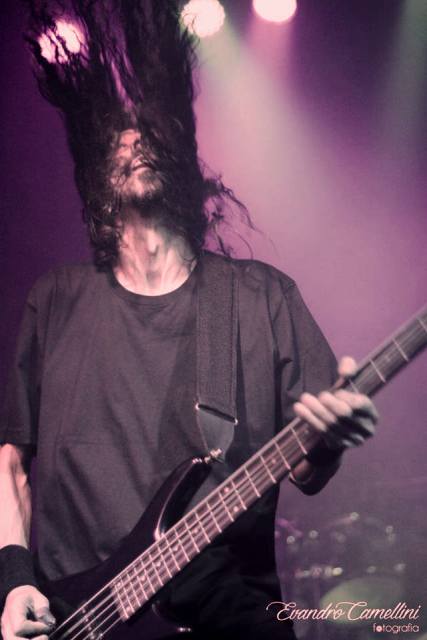
MLeite: We got nothing to complain, man...2014 has been a great year for us, many gigs going on with good bands, our album being accepted by fans and the band is healthy inside, it’s been awesome!
29. You are going to complete 30 years in 2016, right? Are you preparing anything special for the anniversary?
MLeite: Wow! It’s been a long time...well, we haven’t thought about it yet, but we intend to do something to cheer it up, count on that!
30. Well, we are getting to the end of the interview, Perna and Murillo! Thanks a lot for your contribution and attention! Is there anything you would like to say to the readers?
WPerna: Thank you for this opportunity and to be here on the pages of Oldschool Metal Maniac!
MLeite: I would to thank you, Old School Metal Maniac for the interview, Polish and worldwide headbangers!
Cristiano Passos
Poprawiony (niedziela, 29 marca 2015 21:40)



















